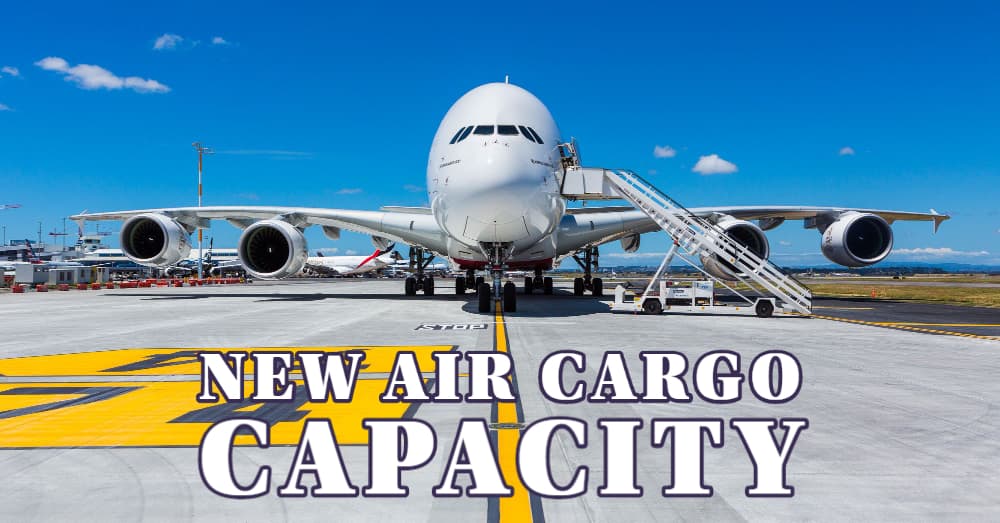
Auckland Airport Stats Show How Covid-19 Changed NZ Imports
3-minute read
Airfreight through Auckland Airport and around the world plunged in April but imports of some products to this country soared, including goggles, disinfectants and toilet cleaner.
As air travel started grinding to a near-halt, equipment to combat Covid-19 took up limited air cargo space, as footwear, clothing and makeup imports plunged.
Figures released by the airport today show that 170 tonnes of disinfectant (up 7571 per cent) was imported through Auckland along with 44 tonnes of goggles (up 10,587 per cent) and 27 tonnes of toilet cleaner (up 1586 per cent).
Footwear imports fell by 82 tonnes (94 per cent), skincare was down by 74 tonnes (88 per cent) and clothing down 417 tonnes (84 per cent).
The airport’s general manager of aeronautical commercial, Scott Tasker, said the impact of Covid-19 on the reduction in air cargo capacity had been seen fully for the first time in the trade data for April.
“The majority of air cargo flies in and out of New Zealand in the belly-hold of passenger aircraft, so when the border effectively closed in late March there was also a sharp drop in cargo capacity,” Tasker said.
In April there was a 43 per cent year-on-year decline in total cargo tonnage, while capacity fell 53 per cent.
“The data reflects the country during full lockdown, with the fast delivery times of air cargo being used to bring in greater supplies of PPE, cleaners, disinfectants, respiratory equipment and laptops.
The flip side of that was less clothing, shoes, skincare, machinery and vehicle parts coming via air freight. Those numbers are telling the story of what we all personally experienced over those weeks,” he said.
During April, 11 airlines operated 158 flights using passenger aircraft with cargo-only loads — Air New Zealand, Air Canada, Air China, Cathay Pacific, China Airlines, China Eastern Airlines, China Southern Airlines, Fiji Airways, Korean Air, LATAM and Singapore Airlines.
There were 94 freighter flights operated by five airlines — Qantas, Tasman Cargo Airlines, FedEx Express, Singapore Airlines Cargo and Airwork.
Demand for fresh food products drove a 100 per cent increase in air-freighted exports to Singapore despite a related drop in cargo capacity.
Exports of eggs were up 11 tonnes to 64 tonnes, beef up 12 tonnes to 45 tonnes and salmon up four tonnes to 20 tonnes.
Tasker said at the outbreak of the virus Singapore looked to improve its supply-chain resiliency and diversify food sources.
In April, there were 16 flights to and from Singapore. Singapore Airlines operated about three flights a week using a 747-400 freighter, plus one flight using a B777-300ER passenger aircraft carrying freight only.
Air New Zealand operated one cargo flight using a B789 passenger aircraft.
This month, Singapore Airlines began a five-times weekly cargo-only passenger aircraft service between Auckland and Singapore using an Airbus A350-900, adding 175 tonnes of cargo capacity a week for New Zealand exporters.
Usually, this cargo would be carried in the belly-hold of one of Singapore Airline’s 26-weekly passenger services from Auckland, Christchurch or Wellington, Singapore Airlines’ New Zealand general manager Kenny Teo said.
“Introducing these new cargo-only passenger flights, along with our scheduled three-times-weekly freighter services, will assist in re-introducing much-needed cargo capacity to the New Zealand market,” he said.
In addition to delivering produce to the Singaporean market, cargo is carried onwards to Amsterdam, China, India, Malaysia, Switzerland, South Africa, Thailand, Britain and the United States.
“It’s fantastic to see new air cargo capacity coming online. The economic benefits of these connections will flow out across New Zealand,” Tasker said.
The International Air Transport Association (IATA) released data for global air freight markets in April showing demand dropped 27.7 per cent compared to the same period last year — the sharpest fall ever recorded.

The association said there was insufficient capacity to meet demand as a result of the loss of belly-cargo operations on passenger aircraft.
This had led to sharp price rises for air freight.
Source: NZ Herald
P.S. Easy Freight Ltd helps New Zealand importers & exporters to save money on international freight and reduce mistakes by guiding how to comply with Customs and biosecurity rules.
➔ Contact us now to learn how we can assist you.
